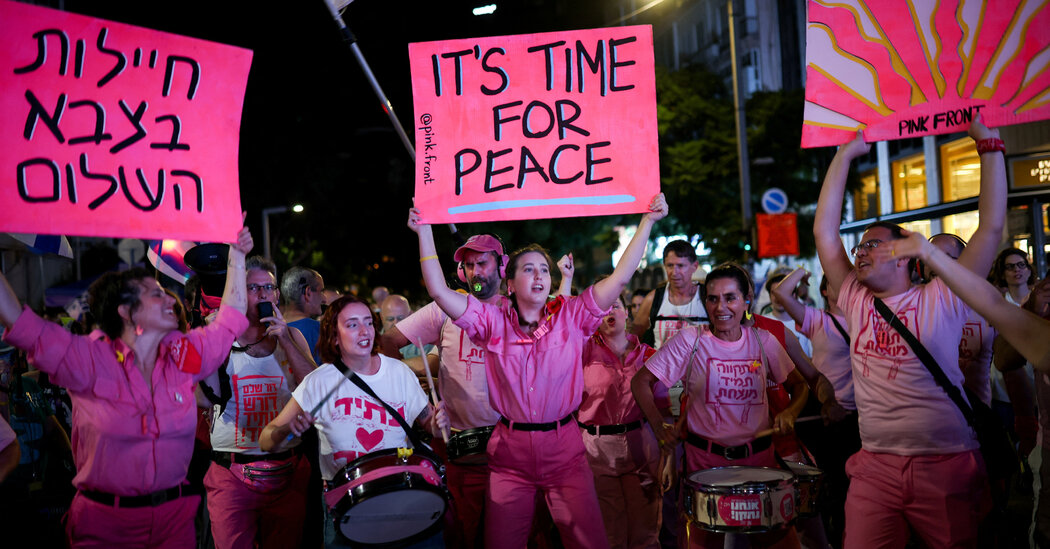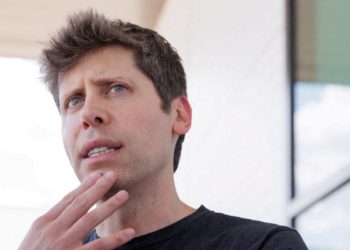The crowd that filled Rabin Square in Tel Aviv on Saturday night to remember Yitzhak Rabin, the Israeli prime minister gunned down there by a right-wing extremist 30 years ago, was not particularly impressive.
There were maybe 50,000 people, many of them middle-aged or older. What stood out was not the turnout, but the frequent uttering of a word that has seldom been heard in large political gatherings in Israel in recent years.
“Yes to peace, no to violence!” people chanted.
“Pursuing peace is a Jewish act,” declared Yair Lapid, the leader of the opposition and head of the centrist Yesh Atid party.
Mr. Rabin “knew that peace is not weakness, but strength and power,” said Yair Golan, a former general who leads the left-wing Democrats party.
The Rabin assassination, on Nov. 4, 1995, brought the Oslo peace process to a violent halt. It also made “peace” a dirty word in Israel’s steadily right-drifting politics, a telltale of naïveté — or, even worse, of leftism.
Now, of course, a new kind of peace process is underway, with a determined Trump administration and its allies in the Muslim world seeking to broaden a tenuous cease-fire between Israel and Hamas into something more.
They are pushing for the demilitarization and reconstruction of the Gaza Strip, beginning with its Israeli-controlled eastern half. They hope to expand the Abraham Accords, which normalized Israel’s relations with Arab states, to countries including Saudi Arabia, Syria or Lebanon. Maybe, they say, there could even be a glimmer of hope for Palestinian statehood someday.
Before any of those ambitious ideas can be realized, however, Hamas must return all the bodies of Israel’s former captives. On Monday morning, Israel confirmed that overnight it had received the remains of three more: Col. Assaf Hamami, Sgt. Oz Daniel and Capt. Omer Neutra, a dual Israeli-American citizen. The bodies of eight others are still in Gaza.
It is a time of great possibility, yet also of great peril.
Prime Minister Benjamin Netanyahu of Israel had to be pressured into agreeing to the cease-fire with Hamas. Many in his coalition would still prefer to break it and return to a full-blown war in pursuit of “total victory,” rather than risk Hamas surviving, regrouping, rearming and rebuilding the capacity to threaten Israel militarily.
In conversations with ordinary Israelis, there is a palpable sense that the nation is at a crossroads — and not just over what to do about Gaza. Tens of thousands more people emigrated from Israel over the past year than immigrated to the country. Many Israelis across the political spectrum say they believe the election to be held sometime in the coming year will be climactic and decisive, with its outcome determining the future character of the country and whether more citizens will choose to stay or leave.
Hanging in the balance is a fraught part of Israel’s social contract. It is a tattered binding between the ultra-Orthodox, hundreds of thousands of whom demonstrated in Jerusalem last week to demand the extension of their decades-old exemption from military service, and the tens of thousands of reservists who have exhausted themselves serving multiple tours of duty in Gaza.
Much will hinge on what Mr. Netanyahu decides in the coming months: what he is pressured into doing or accepting, what he prioritizes above all else and what, at 76, he wants his legacy to be.
Much will hinge, too, on how those seeking to defeat him will position themselves to Israeli voters who are worn out from the war but also deeply skeptical of the prospects for peace.
In Saturday night’s speeches, a great deal of attention was paid to how Mr. Rabin had been a warrior for Israel before seeking peace with the Palestinians.
There were also acknowledgments of how much the current political mood in Israel resembles the charged, polarized atmosphere that preceded Mr. Rabin’s murder.
Mr. Golan, the former general, saw his rise through the military ranks end after a 2016 speech in which he drew parallels between contemporary Israel and Germany before the Holocaust. On Saturday night, he said the three shots that killed Mr. Rubin still echo today, “every time the government incites against its citizens, every time patriots are called traitors, every time protesters exercising their civic responsibility are beaten.”
Mr. Lapid, the centrist opposition leader, argued that the right-wing and religious parties in the governing coalition, like Mr. Rabin’s detractors, were distorting the very idea of Jewishness and turning it into something violent.
“The violent racism of Itamar Ben-Gvir is not Judaism,” he said, referring to Mr. Netanyahu’s national security minister. “Anyone who suggests dropping an atomic bomb on Gaza does not represent Judaism,” he added, referring to another ultranationalist minister’s suggestion.
“Settler violence is not Judaism,” Mr. Lapid said. “Judaism does not belong to the extremists, nor to the corrupt, nor to the draft dodgers.”
David M. Halbfinger is the Jerusalem bureau chief, leading coverage of Israel, Gaza and the West Bank. He also held that post from 2017 to 2021. He was the Politics editor of The Times from 2021 to 2025.
The post In Israel, an Unfamiliar Word Is Heard: Peace appeared first on New York Times.




